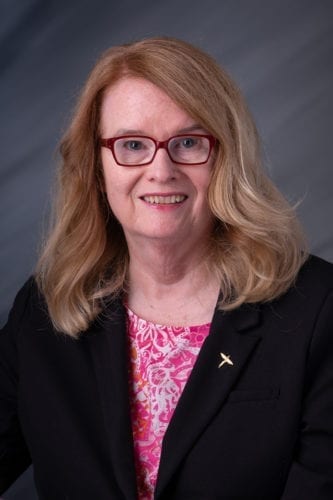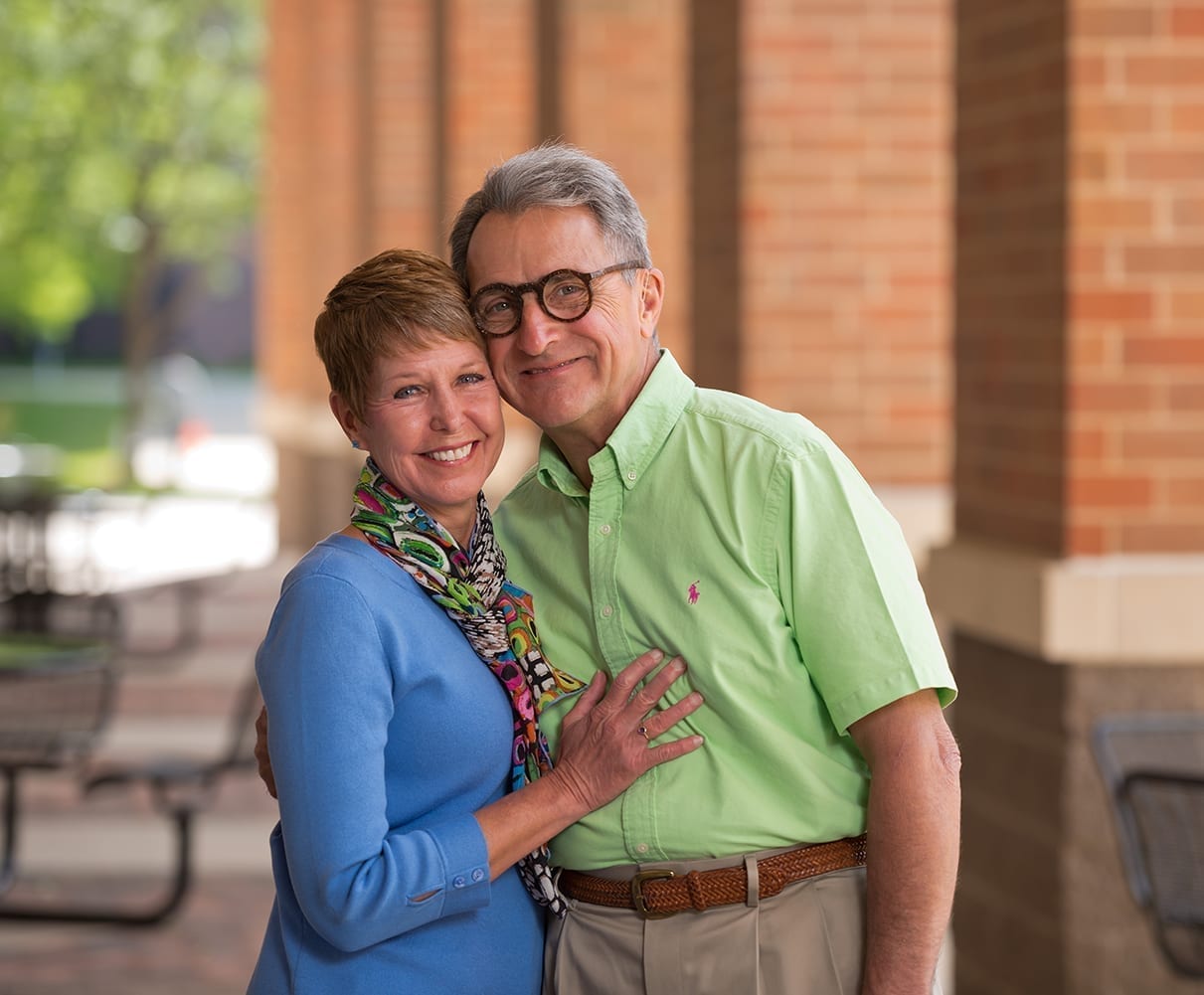The three associate professors who retired this summer to emeriti faculty status have served the University and its students for more than three decades each. Here they look back and ahead to life after DMU.
O’Connell cultivates eclectic interests

“I went into the interview with a professor who sat behind a big desk. When I told him I wanted to become a scientist, he asked, ‘Well, how are you going to take care of your kids?’” she recalls. “I wasn’t selected for that program.”
She wasn’t dissuaded, however. Growing up in Manhattan, the self-described “nerd” pursued other scientific opportunities. She took three trains one way to participate in a summer class at Rockefeller University in which students conducted science experiments and took field trips. She enrolled at Cornell University the summer after she graduated from high school.
“I was allowed to skip freshman year and took a variety of classes – French, Greek philosophy,” she says. “My grades were all over the place, but I did well on the GRE.”
More than well enough: After graduating from Cornell, she went to the University of Rochester to earn a master of science degree in biology and a joint Ph.D. in biology and neurobiology. “Back then, they weren’t sure neurobiology would be a thing,” she reflects.
O’Connell completed one postdoctoral fellowship in a neural encoding laboratory in the department of biomedical engineering at Johns Hopkins University, and then another in the Kresge Hearing Research Laboratory of the South at Louisiana State University Medical Center in New Orleans. With previous experience as a teaching assistant and instructor, she landed a position as visiting assistant professor of biological sciences at Loyola University in New Orleans.
“I taught as a sabbatical leave replacement – I was trying teaching,” she says. “We had a lot of freedom as faculty. Teaching was fun.”
Around that time, O’Connell got a letter from the University of Osteopathic Medicine and Health Sciences, now DMU, about a position on the physiology and pharmacology faculty. She applied. The day she arrived on campus for her interviews in early June 1984, Iowa had just experienced the greatest outbreak of tornadoes in a single day – 26 – in its recorded history.
“I was really relaxed for my interviews, because I thought no way I was going to come here; they have tornadoes,” she says.
Fortunately for generations of DMU students since then, O’Connell was wrong. “I’ve really enjoyed teaching and my time here,” she says.
In retirement, O’Connell will continue her hobby of training, breeding and showing Papillons, a toy dog with large, wing-shaped ears that give the breed its name (“papillon” is French for “butterfly”). She hopes to return to horseback riding, which she first did in graduate school. She’s also a big fan of ballet and opera and a member of the Des Moines Opera Guild. In June, after daughter Caitlin completed her medical residency, the two traveled to Ireland. O’Connell wants to finish some projects at home, too.
“It was hard as a single mother to go to work, give time to my kids and the dogs, and do anything with the house,” she says. “I have no giant plans, though. It might be that organizing a closet is my goal for the week.”
A chat with the Chambers

As they reflect on their tenure in Dan’s office on the third floor of the Academic Center – where a coffee mug on his desk states, “I’m a physician assistant – just like a doctor but much cooler” – it’s clear the couple value each other as colleagues and friends as well as spouses.
“I wouldn’t even be here if it wasn’t for this guy,” Pam says. “I wouldn’t have had the confidence to do anything but be a nurse. My high school guidance counselor told me I couldn’t go to college, but I could go to Iowa State University for a year to find a good husband. Dan told me for many years I could do what the medical students do.”
He had the perspective: A U.S. Air Force flight surgeon medic for four years during the Vietnam War, Dan was in southeast Asia when he “heard about this PA thing.” The profession was just getting off the ground to address the shortage of primary care physicians in America.
“Dan is one of the founders of our profession,” Pam says.
He dually considers her to be his biggest inspiration and influence. “She started here as a nurse, joined the faculty and became a practicing PA,” he says. “I tend to be considerably more outspoken at times than I might need to be. She has always been a calm guide and helps me see the other side. We talk shop pretty much all day, every day.”
“And we don’t even know we’re doing it,” Pam adds.
They’ve had plenty to talk about over the years, including the PA program’s transition to a master’s degree in the early 2000s. Dan took the lead in designing a new curriculum, which now comprises 133 credit hours that students complete in 25 months.
“That’s 80 credit hours in the first year – at the graduate level,” Dan marvels.
“All I can say is it’s the hardest thing you’ve ever thought about doing,” says Pam.
That’s why admitting the right students is important.
“It’s an enormous responsibility to scan through 750 applications for 50 seats each year and determine whether they are a good fit for DMU and, more importantly, a good fit for the profession,” she says. Adds Dan, “I tell students before they go on clinical rotations that people they work with are going to look at the patch on their jacket and see this is what our program is like.”
He and Pam praise the preceptors, including many PA program alumni, who provide clinical rotations for students. She has served in another important alumni role – as a member and president of the DMU Alumni Association Board of Directors. The 2011 College of Health Sciences (CHS) Alumna of the Year, she also served on the CHS Alumni Council from its inception to its merger into the University’s single, unified alumni board.
“I love working with other alumni and getting them to see the positive things we’ve done on campus,” she says. “I believe our responsibility as alumni is to put an effort out for our students – as preceptors, mentors, campus speakers and donors. But the main thing for alumni is they have to get back to campus.”
Retired, Dan says he’ll miss daily interactions with other faculty and students; Pam will miss “being relied on for my wisdom.” But retirement won’t entail much sitting around. Continued clinical practice may be an option. Pam’s three horses, Dan’s woodworking hobby and their volunteering at the Iowa State Fair will keep them busy. Pam continues as a longtime volunteer for the Leukemia and Lymphoma Society. And they can always look back on careers of “graduating really solid clinicians,” as Pam says, and “developing happy alumni,” as Dan puts it.
“When students come back after the clinical year and talk to you, you think, ‘My God, they’re health care providers and I had a small part in that,’” he says. “It’s amazing the personal and professional growth that takes place.”

